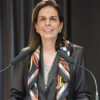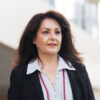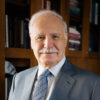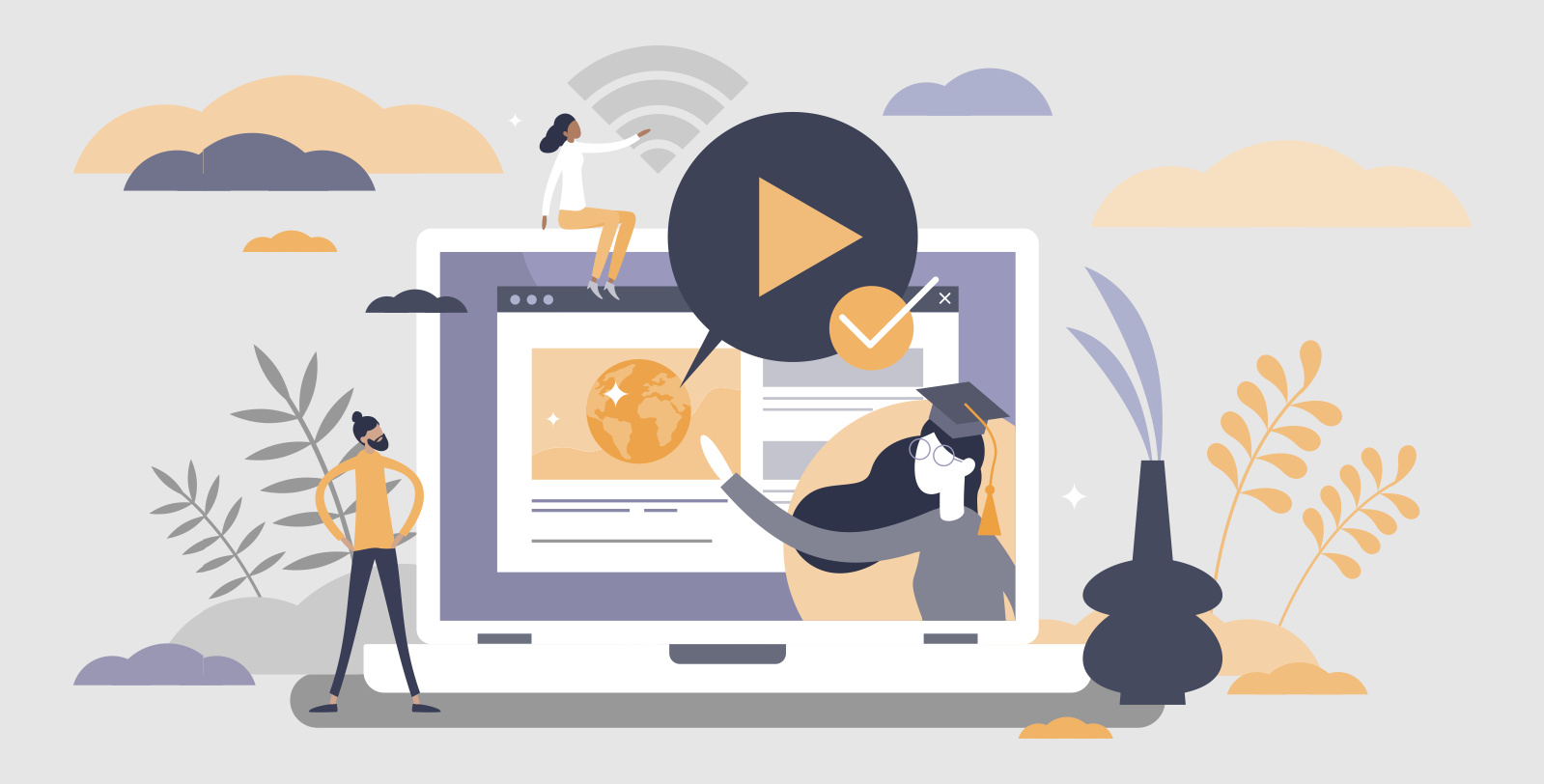The ongoing pandemic and the shift to full e-learning that it brought in numerous countries, including Focus on Education Greece, have forever changed this generation of students. For over a year now, Covid-19 has been causing an unparalleled disruption of education systems around the world, affecting nearly 1.6 billion learners in more than 190 countries, forcing educational institutions and students alike to adapt to the new reality. In this issue of Business Partners, education experts discuss the challenges of shifting to distance learning as well as the longterm benefits this shift may prove to have for education.

Distance Learning Won’t Keep Us Distant
By Claudia Carydis Benopoulou, Vice President Public Affairs, The American College of Greece (Pierce-Deree-Alba)
The American College of Greece managed to cope with the challenges of shifting to e-learning, swiftly and efficiently, continuing to offer valuable student services. Distance learning is here to stay even after this pandemic goes, and we are all grateful for the fast pace of changes brought by technology. Still, for ACG, it was equally important to continue to support its students’ wellbeing. During the pandemic, ACG increased financial aid, offered psychological counseling and organized stimulating online discussions and events. ACG also continued to contribute to the broader community, providing face shields produced in our school’s fab lab and organizing blood drives in support of public hospitals. Pierce students donated tablets to a local public school. Deree students continued to collect surplus food from the Holargos open market, in support of local charities, and colleagues baked sweets in the school’s kitchen to be distributed to people in need, in celebration of Easter.
Building on its history of academic excellence and social impact, ACG is leading by example and remains committed to contributing to a sustainable, adaptive and resilient society, while providing its students, the leaders of tomorrow, the inspiration and skills to become engaged and responsible citizens.

Nurturing Resilience
By Dr. Peggy Pelonis, President, ACS Athens
The Covid-19 pandemic called for a different kind of learning that would ensure uninterrupted instruction but which also required a well-thought plan that prepared teachers and learners prior to the disruptive change that took place. The pandemic forced students to become independent learners, self-motivated and disciplined, and while life turned upside down, children were expected to continue their days without disruption: to do their homework, be disciplined, and do as they are told—ignoring or often unaware of their psychological struggle to make sense of the unknown. In reality, the life lessons learned and the internal conflicts they face are real attempts to cope with and navigate uncharted territories.
At ACS Athens, a K-12 American International school, online instruction began almost immediately to ensure that learning remained intact. Four pillars were considered necessary to ensure a smooth and seamless transition to the digital platform: a well-planned online instructional methodology, continuous training to ensure reflective practitioners, carefully designed research-based synchronous and asynchronous instructional screen time to avoid adverse psychological effects due to prolonged time on the screen, and the development of conscious citizenship. Despite such preparation, the question remains, will this generation be permanently traumatized or are they on their way to building unwavering resiliency?

Covid-19 and the Mutation of the Business Education Learning Model
By Dr. Stefanos Zarkos, Associate Dean of Academic Programs, Associate Professor in the Practice of Finance; Alba Graduate Business School, The American College of Greece
he Covid-19 pandemic imposed major challenges on three levels—interpersonal, administrative and academic—with considerable impact on all key stakeholders of our school, from students and faculty to alumni and supporters. While there are differences between face-to-face and online education, the issue isn’t to argue which is better or worse. People became familiar with various e-learning applications and will most likely continue using them even after the Covid-19 Era. Several business schools around the world have adopted, or are considering doing so, a hybrid approach to delivering their academic programs, combining online, synchronous and asynchronous sessions with face-to-face classes. The combination of e-learning with face-to-face class sessions could allow students to overcome distance restrictions by reducing the need for regular physical presence in class while at the same time enabling schools to maintain face-to-face contact through live, synchronous and occasional sessions with physical presence. Thus, students will continue to be an active part of their school’s overall learning ecosystem, benefitting from the networking and interaction with their fellow students, faculty and admin staff and receiving various support services (career services, student counseling, etc.) that add significant value to their learning experience.

Space Separates Our Bodies—Not Our Minds
By Theoni Scourta, Vice President for Academic Affairs, College Year in Athens
While digital and internet technologies have greatly improved our connectivity and communication despite geographical limitations [in the words of Erasmus: space separates our bodies, not our minds], the ongoing pandemic and the turn to online instruction highlighted challenges that had to do with the very nature of study abroad: the experiential character of learning.
How do we bring authenticity into virtual environments? And how do you engage the senses in a learning experience when visiting archaeological sites is impossible? At CYA we took a positive attitude, viewing flexibility and the constant readjustments of schedules and curriculum as part of the design solution and not as a problem, and this helped us imagine a more diverse way of learning.
The value of study abroad is in the experience of the other, in getting to know and understand the host culture, even replicating the example of the other. So in a world where one can very easily be exposed to cultural differences online, what is the post-pandemic value of study abroad? We believe that the fact that all of us around the globe are sharing the same experience has connected us in an extraordinary way. In the words of one of our Spring 2021 students, currently in Athens: “I live the Greek experience of the pandemic.”

Quality Higher Education in the Midst of a Pandemic
By Leonidas Phoebus Koskos, Esq., President, Hellenic American University
In addition to the key challenges that the Covid-19 pandemic brought to higher learning institutions across the globe, it also brought to the surface, violently and cruelly, the lack of readiness and willingness amongst administrations, faculty and students to cater to the needs of digital transformation in education.
Hellenic American University, despite its size and limited resources, effectively addressed the challenges of the pandemic (with zero classes missed), exploiting its technological infrastructure, to the fullest to ensure a smooth and effective shift from conventional classroom learning to a totally virtual learning environment. Classes were delivered using the new modalities, services such as mentoring and the library continued, and not a single meeting was canceled or postponed. HAU’s academic and administrative life was never disrupted or compromised, and the University remains fully operational, offering high-quality and inclusive learning in a collaborative and highly interactive environment.
HAU is entering the new era in education supported by state-of-the-art technological infrastructure and a readiness to embrace the challenges of the digital world. The pandemic proved beyond any doubt that we are ready to face any new pandemics ahead and to deliver quality teaching in hybrid modalities taking advantage of our top-of-the-line infrastructure.

Finding Opportunity in Crisis
By Sophia Katsaouni, Headmistress, Othisi Junior High School
Undeniably, the pandemic brought about unprecedented and unexpected changes in all areas of life, and education was no exception. Teachers and students had to switch to distance learning practically overnight and often totally unprepared. Schools exhibited different degrees of adaptability and efficiency, depending on their level of existing online tools (e.g. portals), training and supervision, the teachers’ level of digital competence, but also their personal desire to learn, adapt and be efficient. As a result, considerable gaps emerged among schools in the quantity and quality of online teaching and learning, on the part of both teachers and students who, in some cases, couldn’t or wouldn’t respond adequately. We were all navigating uncharted waters. Some teachers appeared to be resistant to change or had difficulty adapting; some students took to the new method of instruction immediately, while others were totally absent, literally or metaphorically. However, some educators managed to enhance their teaching by introducing new tools and resources, becoming more flexible and knowledgeable and making their lessons appealing and engaging even under these trying circumstances. Isn’t this, after all, the core of education? To constantly incorporate new ideas, blaze trails and adapt. To be role models for our students.

Ready to Fight for It
By Dr. Roxanne Giampapa, Head of School, Pinewood American International School
Let’s start with this: The pandemic has shaken our resolve about the purpose and practice of educating Gen Z and we should be thankful that it did. It has given us a welcome opportunity for a reset—a shift in how we do schooling.
In her article ‘The pandemic is a portal,” Arundhati Roy writes: “[The pandemic] offers us a chance to rethink the doomsday machine we have built for ourselves. Nothing could be worse than a return to normality. Historically, pandemics have forced humans to break with the past and imagine their world anew. This one is no different. It is a portal, a gateway between one world and the next. We can choose to walk through it, dragging the carcasses of [the past] behind us. Or we can walk through lightly, with little luggage, ready to imagine another world. And ready to fight for it.”
At Pinewood, we are walking through the portal lightly, with only one timeless student question: “Why do we have to learn this?” As we reset schooling to answer this question vis-à-vis real-world relevance, the common good, and original and divergent thinking, we are designing another world… of schooling. And we’re ready to fight for it. Are you?

Reaching the Unattainable
By Dr. Haido Samaras, Academic Dean, CTY Greece; Computer Science Instructor, Anatolia College
In the midst of a pandemic the likes of which we had only read about in books, the disruption that we’ve been witnessing in education, with classrooms turning virtual and educators graduating from technophobes to technogeeks, is evidence that the Covid-19 crisis has accomplished feats and transformations at speeds that even Superman would not have been capable of.
Anatolia College in Thessaloniki is determined to get its students ready for a radiant future in a post-Covid-19 world by taking advantage of prospects visionaries preached about but the rest of the world never really imagined attainable, such as truly placing learners in the center of the learning process and supporting teachers to reinvent everything, from content to resources to tools to strategies, in order to best serve their learners’ needs. Nothing will ever be the same again and why should it when the possibilities of online and hybrid environments, as well as emerging AI applications for collaborative, personalized, self-paced, lifelong, accessible and inclusive learning outweigh their limitations and the pursuit of interactive, engaging, collective and innovative virtual scenarios based on timeless pedagogy and constructed to blend with creative open-minded teachers has never been closer to becoming a reality than it is today.


